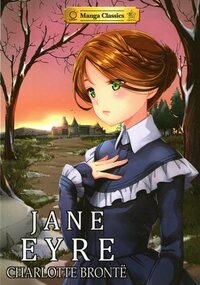Take a photo of a barcode or cover
I am so bad at writing reviews of classics. It's like the moment a bunch of other, more important people decide "yep, this is a Good Book, this is a Classic Work of Literature™", my brain goes "well, I'm out."
But, after trying hard to scrounge up some Opinions on Jane Eyre, here they are:
— The writing is nice! I know it's what makes the book hard to get through for some people, but I did enjoy it (mostly, at least. The good thing about superfluous writing is that it's, you know, superfluous. If you get tired of it, you can usually skip a couple of paragraphs without missing anything. Which I did occasionally.)
— I don't, technically, like Rochester, but because I loved the writing all the declarations of love were beautiful anyway. If you'd told me I would feel this way before I started reading it I probably wouldn't have believed you.
— I noticed Jane's explanation about how she's always on the extreme: either completely defiant, or completely obedient. But I didn't actually expect to see so much of the latter, given how much the introduction to this edition waxed poetic about Jane's defiant nature. I really get that little note about how Jane does appear weirdly subservient at times now. It's like, hon, St. John's evil. Stop doing whatever he wants??
But, after trying hard to scrounge up some Opinions on Jane Eyre, here they are:
— The writing is nice! I know it's what makes the book hard to get through for some people, but I did enjoy it (mostly, at least. The good thing about superfluous writing is that it's, you know, superfluous. If you get tired of it, you can usually skip a couple of paragraphs without missing anything. Which I did occasionally.)
— I don't, technically, like Rochester, but because I loved the writing all the declarations of love were beautiful anyway. If you'd told me I would feel this way before I started reading it I probably wouldn't have believed you.
— I noticed Jane's explanation about how she's always on the extreme: either completely defiant, or completely obedient. But I didn't actually expect to see so much of the latter, given how much the introduction to this edition waxed poetic about Jane's defiant nature. I really get that little note about how Jane does appear weirdly subservient at times now. It's like, hon, St. John's evil. Stop doing whatever he wants??
Ugh. Overdramatic, far too emotive, and why is it always raining? Rochester unsettled me rather than charmed me, and I found Jane to be irritating and painful to slog through. A painful book to finish. Does not want.
3/2/09: On reading this a second time (still slogging through) I stand by most of my original opinions. I still don't like Rochester, and it would be nice if Jane grew a spine earlier on in the narrative. Enjoyment-wise, I would probably get more use burning this thing for warmth than reading it. But for a literary critique (which is where I find myself again), it's extremely useful. I may not be a fan of Charlotte Bronte, but she is a particularly good source to use for studying English literature.
3/2/09: On reading this a second time (still slogging through) I stand by most of my original opinions. I still don't like Rochester, and it would be nice if Jane grew a spine earlier on in the narrative. Enjoyment-wise, I would probably get more use burning this thing for warmth than reading it. But for a literary critique (which is where I find myself again), it's extremely useful. I may not be a fan of Charlotte Bronte, but she is a particularly good source to use for studying English literature.
Me lo he tenido que leer para Literatura Inglesa, por tanto he tenido el gozo de leerlo en versión original. Antes de empezar a leerlo me vi la producción de la BBC basada en la novela. Primera cosa que hay que decir, todo lo que se haga en película de esta novela quedará irremediablemente limitado, dado que el libro, escrito en primera persona, disfruta de una de las expresiones de sentimientos más complejas y completas que he tenido el gusto de leer. Jane es una joven apasionada, en la película no lo parece tanto. Cree en la necesidad de justicia y de bondad, es ingenua, pero una ingenuidad templada con la experiencia. Hasta cierto punto parece que ella desea ser inocente, o, mejor dicho, desea ser Helen, pero con la pasión propia suya.
Sigue leyendo...
Sigue leyendo...
ALL THE STARS. NEW OTP. NEW FAVORITE BOOK. YELLING.
Yeah, I loved this. I can't believe that I thought this was the Bronte book I wasn't going to like. So happy to be wrong! I loved pretty much everything about this book, and I already want to reread it.
Yeah, I loved this. I can't believe that I thought this was the Bronte book I wasn't going to like. So happy to be wrong! I loved pretty much everything about this book, and I already want to reread it.
I read this book expressly to be able to read The Eyre Affair. It took a couple of tries to get through it, and in the end, I was too exhausted to actually get to The Eyre Affair. I enjoyed the first part a bit - I love spunky heroines, even if their circumstances are a bit over the top. But once she falls in love with a complete jerk (I never figured out why he's supposed to be such a romantic figure, but then, I've never understood the big deal about Romeo, either), she becomes a completely repressed wash-out.
I like novels to either have at least one character I don't hate, or be Madame Bovary, and this was neither. I am only giving this two stars because the first ten chapters or so were somewhat enjoyable.
I like novels to either have at least one character I don't hate, or be Madame Bovary, and this was neither. I am only giving this two stars because the first ten chapters or so were somewhat enjoyable.
This is an old favourite and one that I come back to every few years. Jane is a character very dear to my heart, very different to Lizzie Bennett, yet I put them in the same place in my head. Jane may be poor, plain and friendless, but she is a strong character. Although she plays the part of subservient, demure governess, the relationship between her and Mr Rochester is anything but.
I always find the start and end of the book a bit difficult. The start because I empathise with Jane immensely, and her cry of "unjust" rings through my head as I follow her, first through the trials of Gateshead, from "master" John to the Red Room, then through Lowood school and the heartbreakingly good Helen Burns. The tail end, after she's left Thornwood, I find hard for a different reason: the character of St John Rivers. He's dizzyingly stern and uncompromising as a rod, but more than that, I find him intensely creepy. His domination of Jane is very different to her relationship with Rochester. It's not just the lack of love, but the fact that he knows what he's proposing will kill Jane quickly and it doesn't move him. This time round, I also realised that he's a windbag, as well as being sanctimonious. All praise to Brontë for an incredible character.
I love the various set pieces throughout the book, from the first meeting with Rochester on Hay Lane, through the bedroom fire, "portrait of a governess", the fortune teller, the wedding right through to "Pilot knows me" and, of course, "Reader, I married him." These are just the scenes that come to mind off the top of my head, there's very little of the book that I dislike at all. Even the opening and tail end sections I talk about above are marvellous to enjoy and I mention them specially only because of the intense emotions they invoke: the true sign of a master storyteller.
I've not mentioned Bertha Mason in this review. She's a problematic character to modern sentiments but fits the gothic and dramatic tone of the book. I believe various books have been written to tell her story and paint her more sympathetically, although I've not read any. I just ned to put my "product of its time" filter firmly in place (something I've had practice with, as a fan of Golden Age SF).
(Aside: I happened to be rereading this book when a touring theatre production of Jane Eyre came to my city. It was incredible: intense, modern, touching on all the highlights of the book, condensed into a stage play. If you have the chance, do go and see it.)
I always find the start and end of the book a bit difficult. The start because I empathise with Jane immensely, and her cry of "unjust" rings through my head as I follow her, first through the trials of Gateshead, from "master" John to the Red Room, then through Lowood school and the heartbreakingly good Helen Burns. The tail end, after she's left Thornwood, I find hard for a different reason: the character of St John Rivers. He's dizzyingly stern and uncompromising as a rod, but more than that, I find him intensely creepy. His domination of Jane is very different to her relationship with Rochester. It's not just the lack of love, but the fact that he knows what he's proposing will kill Jane quickly and it doesn't move him. This time round, I also realised that he's a windbag, as well as being sanctimonious. All praise to Brontë for an incredible character.
I love the various set pieces throughout the book, from the first meeting with Rochester on Hay Lane, through the bedroom fire, "portrait of a governess", the fortune teller, the wedding right through to "Pilot knows me" and, of course, "Reader, I married him." These are just the scenes that come to mind off the top of my head, there's very little of the book that I dislike at all. Even the opening and tail end sections I talk about above are marvellous to enjoy and I mention them specially only because of the intense emotions they invoke: the true sign of a master storyteller.
I've not mentioned Bertha Mason in this review. She's a problematic character to modern sentiments but fits the gothic and dramatic tone of the book. I believe various books have been written to tell her story and paint her more sympathetically, although I've not read any. I just ned to put my "product of its time" filter firmly in place (something I've had practice with, as a fan of Golden Age SF).
(Aside: I happened to be rereading this book when a touring theatre production of Jane Eyre came to my city. It was incredible: intense, modern, touching on all the highlights of the book, condensed into a stage play. If you have the chance, do go and see it.)
It is a tribute to the writer's artistry that one outlandish event happens after another and yet it remains totally believable. I also liked that both hero and heroine are homely - a refreshing change although it makes me doubtful as to the film adaptations. This is the second time I read this - I went on a Bronte kick about 20 years ago, and came away an Anne Bronte fan - so I suspect I got a lot more out of this book this time.
This is the second time reading Jane Eyre, and it's even better than I remember it! Brontë was truly an amazing writer.






